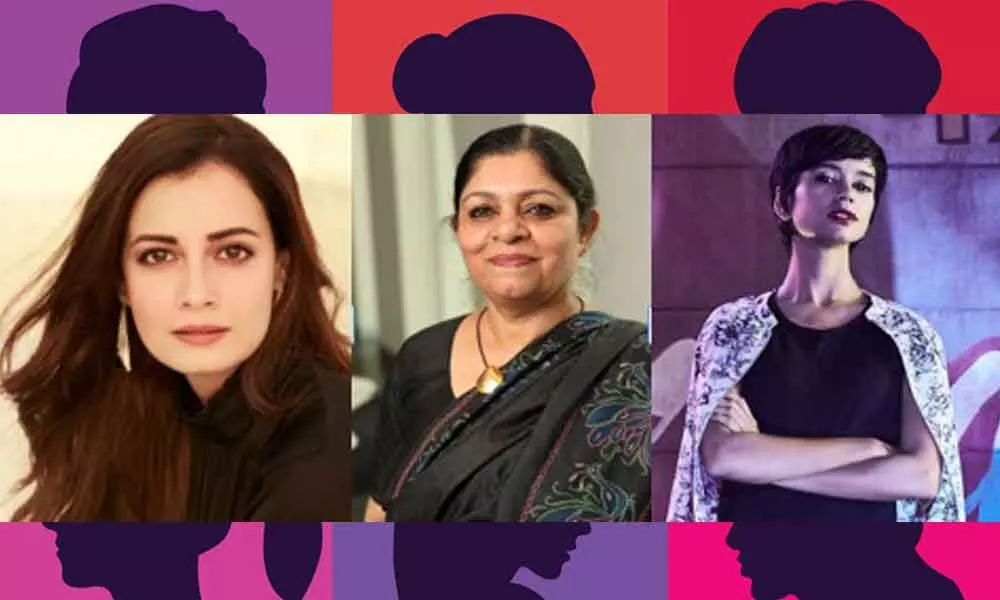Every choice we make as women is going to make a big difference: Dia Mirza

Every choice we make as women is going to make a big difference: Dia Mirza
On the occasion of International Women's Day yesterday, in a panel organised by the Population Foundation of India, actor-producer Dia Mirza engaged in conversation about 'Sharpening the focus of gender justice in a Covid-19 world'. "I keep reiterating the fact that these conversations are so important to help more women recognize that agency can make a big difference in our lives.
When we talk about building back better from this global pandemic, even as we are far from halfway through it, we will have to work much harder to ensure that women are safer and get the opportunities to first of all express what it is that they have been through," Dia said emphatically in her dialogue with fellow panellists Poonam Muttreja, executive director, Population Foundation of India (PFI) and rapper and digital content creator Sofia Ashraf, whose viral video Kodaikanal Won't addressed the mercury poisoning caused by a Unilever factory.
The e-panel brought together diverse perspectives from women who are leaders in their own fields and shared their experiences, insights and suggestions about achieving a more equal India this year.
The context of the discussion focussed on how the onset of an unprecedented pandemic in 2020 led to vulnerable women across the world bearing the brunt of the ensuing economic, social and domestic fall out. However, resilience as frontline workers, educators, caregivers, leaders and domestic warriors also showed that that women are equally involved in the recovery from the pandemic.
Poonam Muttreja articulated the severe impact of the pandemic on women, thus, "In the small towns and cities, there was no private health service available, and with public health systems struggling, women struggled to give birth safely. Many women delivered stillborn babies in cities and across the rural parts of India, and we also saw heart-wrenching images of migrants and pregnant women walking to their villages.
Many delivered babies on the roadside. I don't know if India's conscience will ever be clear of guilt for having witnessed that." Dia further echoed the sentiment. "It's important to shine the light on what a woman has been through because that will encourage change. If we don't know half of the truth then how can you address the problem? I am actually grateful for the phenomenal work that a lot of NGOs did throughout the lockdown," she added, citing the number of campaigns and outreach programs that came into action over 2020.
Sofia Ashraf focused on the power of art and performace as tools that can give women choice and agency as she does through her work. Said she, "While it is vital to use art to speak out about issues to raise awareness and hopefully bring about policy change, I believe art alone cannot bring about policy change. You need people like Poonam Muttreja and Dia Mirza, the media, and all of us working in tandem. But what art can do is capture people's attention which today is the most precious commodity." Sofia referred to her experience with 'Kodaikanal Won't,' where initially people were sceptical about how a rap song could address a serious issue. But as Sofia explains, "What we were trying to do was get people's attention and then divert it to KodaiMercury.org, the petitions, the lawyers, the Kodaikanal's Workers Association. Thanks to that song, 591 employees were compensated by the company that was responsible for polluting. I think that's the best thing that an artist like me could ever hope to achieve!"
The panel also discussed how women can influence change through their choices. Dia shared how she invited a priestess to preside over her wedding ceremony. She added, "I really think as women we have a really big role in making that difference with small and big choices. It's never too late to empower yourself. I think we need to change the environment of our politics, society so that we can reduce the gender gap one step at a time."
Poonam reiterated that women leaders have set the bar high during the pandemic and have statistically proven to be better at managing the crisis because their leadership style was more collective than individual, more collaborative than competitive and more empathetic than commanding. She applauded former Health Secretary Preeti Sudan, and Vandana Gurnani who heads the National Health Mission for their tireless work towards addressing women's sexual, reproductive and maternal health. She added, "And then look at our female heroes, three million women health workers who actually led the fight against the pandemic at the grassroots level. Our experience has been that if you give women an inch of leadership, they run with it and find solutions!"
Change is possible, the panelists hoped and their own lives are proof that every woman is indeed a potential change maker.














